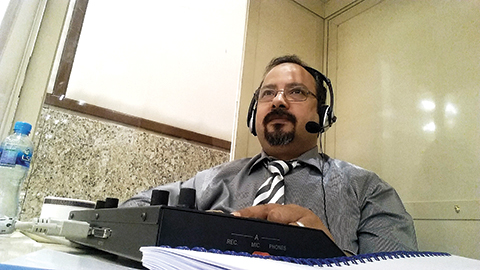 Dr Emad Abulnsr
Dr Emad AbulnsrKUWAIT: Obtaining information from all fields and systematically learning new terms is a major part of a translator's job. Dr Emad Abulnsr, a senior translation specialist and interpreter, spoke to Kuwait Times about his profession. Some excerpts:
Kuwait Times: When did you start your career?
Dr Emad Abulnsr: I began translating in 1987 after graduating from university in Egypt. I came to Kuwait in 1994, and I have been working here since. I do both written translation and simultaneous interpretation from Arabic into English and vice versa in Kuwait and other countries too. I also speak some German, but not well enough for translation.
Kuwait Times: Describe a typical day?
Abulnsr: I start my duty at 8 am at one of the ministries as a senior translation specialist, where I do translation work myself and also supervise other written translations done in my department by my colleagues. I work at the office till 1:15 pm on the days when there are no conferences, otherwise I participate in official conferences taking place there. After work, I run a freelance translation business, where I do both written translation and simultaneous interpreting.
Kuwait Times: What are some of your most significant works or participations?
Abulnsr: I participated as a simultaneous interpreter at all three Syria donors' conferences at Bayan Palace. I was also the interpreter at the first Asian Cooperation Dialogue Conference, in addition to many other conferences and meetings with prominent figures, the latest of whom was Bill Gates during his recent visit to Kuwait. I have also translated most if not all IMAX movies and also translated a book about marine environment in Kuwait for the Environment Public Authority.
In addition, I translated 'Eureka,' a science encyclopedia published by the Kuwait Foundation for the Advancement of Sciences, and many others. I am currently working on translating a book about Prophet Muhammad (PBUH), 'The Gifted Mercy,' from Arabic to English, which is expected to be published this June.
Difficulties
Kuwait Times: What are the difficulties that you face in your profession?
Abulnsr: The most exhausting thing is working under pressure. This especially happens when the client gives us a shorter time than what is actually needed to accomplish the task, so we have to work under pressure and overtime to finish on time and meet the deadline. Another difficult situation is when I am hired to interpret at a conference without being provided with the material that will be used, such as the speeches or presentation slides, so I have no clue what the event is about. This is important as preparing in advance makes our job easier and more accurate. For instance, we can prepare the correct titles of the speakers or names of organizations.
Also, some specialized conferences include special terminology, so preparing in advance is important. But when we are not prepared, we feel pressure on the mind as you have to instantly dig up a word. Also, there may be new words and terms that we might not be familiar with.
Kuwait Times: Any other problems?
Abulnsr: In simultaneous interpretation, international rules state that there should be two interpreters in the booth at the same time, as each translator should translate up to 20 minutes only and then take a break, while the second translator takes over for another 20 minutes. But unfortunately in Kuwait, this rule is rarely followed, and only about 10 percent of events abide by the same. So usually one interpreter works alone for four to five hours, with a short break of 10 to 15 minutes after sessions that can extend up to 90 minutes. Funnily enough, we consume so much energy trying to concentrate for a long period of time, that we emerge from the interpretation booth not only exhausted, but even hungry!
Improvement
Kuwait Times: How do you improve your skills?
Abulnsr: Self-improvement is very important for a translator. If a translator does not keep reading and researching, he will not be aware of new terms. I am also in contact with translators from all over the world, and I now have 1,999 connections from various countries on LinkedIn, for example. Sometimes I also invite them to join us for interpretation at conferences, particularly if rare language pairs are not found in Kuwait. This allows for exchanging views and experiences, which in itself is a credit for both sides. Many times, I also comment on some translation mistakes in public places, stickers, signboards, etc, some of which are very humorous.
In addition to reading and following social media, attending Internet webinars is also a very useful tool for a translator's training. There are a lot of free webinars as well as advanced ones that charge fees. Those who can afford it can also attend the annual international translation conference, where a lot of translation challenges and issues are discussed by specialists in the field.
Kuwait Times: What do you aim to add to your work to improve it?
Abulnsr: I wish to set up an association for translators - such as for other professions - in Kuwait. In other countries, there are associations for translators, but it is very difficult here due to the bureaucracy. When I went to inquire, I was told that signatures of at least 150 Kuwaiti translators are needed to set up a society, while during my 25 years of working in Kuwait, I only know two Kuwaiti translators. So we are now using social media instead to keep in contact, exchange information and discuss our problems. I can say that there are hardly around 20 quality translators here, but the number is gradually increasing.
By Nawara Fattahova










